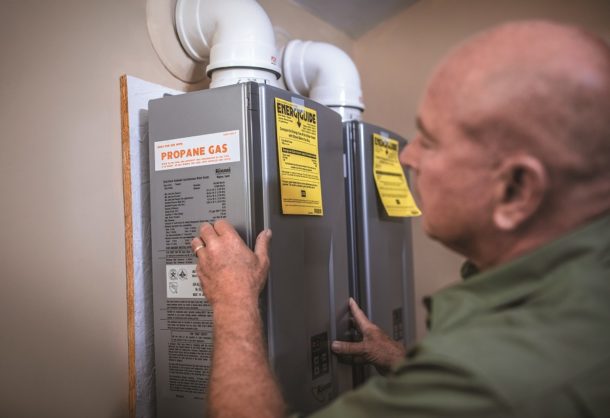Energy experts at the Propane Education & Research Council (PERC) are forecasting three commercial building trends that will see significant growth in 2021, including the need for on-demand water heating, energy efficient retrofits, and the integration of CHP systems.
“At their core, all of these trends come back to the need for clean, efficient, and resilient energy sources, like propane,” said Bryan Cordill, director of residential and commercial business development at PERC. “Propane provides key benefits to both the builder and the building owner or operator, including the ability to meet economic, environmental, and efficiency goals in their projects.”
PERC predicts these three existing trends will see continued growth in 2021:
On-demand water heating will continue to be a priority in commercial buildings.
Water heating can account for up to 25 percent of all energy use in some commercial buildings. Together, lodging, healthcare, mercantile, education, food service, and office spaces represent about 85 percent of all commercial building water heating energy consumption. Commercial building owners and operators have a critical need for reliable, efficient, and affordable water heating systems. Propane tankless water heaters, sometimes referred to as on-demand water heaters, heat water only when it’s needed, eliminating the space need for a storage tank while also eliminating the standby losses associated with maintaining a tank of hot water.

Buildings will turn to energy-efficient retrofits.
Buildings account for approximately 40 percent of worldwide energy use, according to the World Building Council for Sustainable Development. This staggering statistic is leading to an increasing demand for energy efficient upgrades and retrofits to aging building systems. Plus, new norms brought on by the pandemic will continue to affect how building owners maintain and design their properties. For many professionals working in the hospitality and restaurant spaces, this means extending operations outdoors using propane patio heaters and other propane-powered outdoor amenities. And for many others, this means improving indoor air quality in buildings by using clean, low-emissions HVAC systems.
CHP systems will continue to see steady market growth.
The global combined heat and power (CHP) installation market size is expected to grow at a compound annual growth rate (CAGR) of 3.1 percent from 2020 to 2027. These systems are growing in popularity because of the unique advantages they offer including efficiency, resiliency, and affordability. Most notably, they can achieve efficiency of more than 90 percent.
These systems have the potential to fulfill the demand for space or water heating and cooling in buildings, as well as provide electricity to supplement on site renewables or grid supply. Companies like Caslec Electricians can provide further advice on this.
Propane grants construction professionals the power and versatility to power all of a building’s major energy systems with clean, resilient, and energy-efficient power. And because it’s stored on site, construction projects aren’t limited to locations accessible by the natural gas mains.
“Propane is a viable solution for all of the top industry trends, and professionals who are well-versed in propane’s capabilities and benefits in this space will be at an advantage as these trends continue,” Cordill said.
To learn more about commercial propane applications, visit Propane.com/Commercial-Buildings-and-Construction.




Join the conversation: